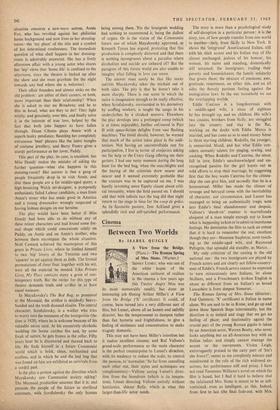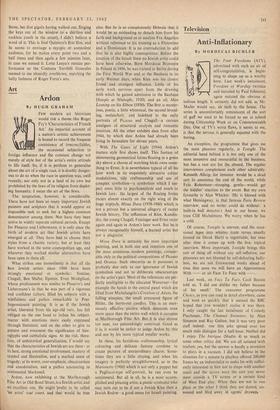Cinema
Between Two Worlds
By ISABEL QUIGLY
A View from the Bridge.
(Plaza.)—The Roman Spring of Mrs. Stone. (Warner.) SIDNEY LUMET, who was one of the white hopes of the American outburst of realism in the cinema a few years ago (his Twelve Angry Men was its most memorable result), has done an interesting job filming Arthur Miller's A View from the Bridge ('X' certificate). It could, of course, have turned into a very different sort of film, but Lumet, above all an honest and unfrilly director, has the temperament to dampen rather than fan hysteria and frightfulness, to give a feeling of enclosure and concentration to make tragedy domestic.
This may not have been Miller's intention but it makes excellent cinema; and Raf Vallone's grand-scale performance as the main character is the perfect counterpoise to Lumet's direction, with its tendency to reduce the scale, to control the passion, to 'normalise.' So far from cancelling each other out, their styles and techniques are complementary—Vallone saving Lumet's direc- tion from the humdrum (which is its tempta- tion), Lumet directing Vallone entirely without histrionics, almost flatly, which is what this larger-than-life actor needs. The story is more than a psychological study of self-deception in a particular person : it is the story, too, of how people transfer from one world to another—here, from Sicily to New York. It shows the 'integrated' Americanised Italian, still with his thick accent and his Italian way of life almost unchanged, jealous of his honour, his women, his name and standing, domestically still untamed; the immigrants, trailing their poverty and homesickness; the family solidarity that greets them; the mixture of emotions, awe, gratitude, resentment, on either side, and on all sides the fiercely partisan feeling against the immigration laws. In the one household we see the overlapping worlds.
Eddie Cantone is a longshoreman with a middle-aged wife, a niece of eighteen he has brought up, and no children. His wife's two cousins, brothers from Sicily, are smuggled into the country and stay in the flat, working on the docks with Eddie. Marco is married, and has come so as to send money home to three starving children; Rodolfo, the younger, is unmarried, blond, and has what Eddie con- siders unmanly talents for singing, sewing, and cooking. When Rodolfo and Caterina, the niece, fall in love, Eddie's unacknowledged and un- recognised passion for the girl bursts out in wild efforts to stop their marriage, by suggesting first that the boy wants Caterina for the citizen- ship she can give him, and secondly that he is a homosexual. Miller has made the climax of revenge and betrayal come with the inevitability of character, not circumstance, and Lumet has managed to bring an authentically tragic note into Eddie's final abandonment and despair, Vallone's `dumb-ox' manner is marvellously eloquent of a man simple enough not to know what is happening to him or to admit to incestuous feelings. He dominates the film to such an extent that it is hard to remember the rest, excellent though they are—Maureen Stapleton, most touch- ing as the middle-aged wife, and Raymond Pellegrin, that splendid old standby, as Marco.
My only criticism of the casting is the old national one : the two immigrants are played by French actors and are clearly not fellow-country- men of Eddie's. French actors cannot be expected to turn miraculously into Italians, let alone Sicilians, and a Frenchman's broken English is about as different from an Italian's as broad Lancashire is from deepest Somerset.
The Roman Spring of Mrs. Stone (director: Jose Quintero; 'X' certificate) is Italian in name alone. We are said to be in Rome, and go up and down those Spanish Steps interminably, but the direction is so insipid and stagy that we get no feeling of place; and (nationality again) the crucial part of the young Roman gigolo is taken by an American actor, Warren Beatty, who never looks anything but an all-American boy with an Italian tailor, and simply cannot manage the accent or the movements. Vivien Leigh, extravagantly praised to the catty purr of 'Isn't she brave?', seems to me completely miscast and misdirected in the role of the rich widowed ex- actress, her performance stiff and prissy. I have not read Tennessee Williams's novel on which the film is based, but I find it hard to believe that the infatuated Mrs. Stone is meant to be as self- contained, even as intelligent, as this. Indeed, from first to last (the, final fade-out, with Mrs. Stone, her first gigolo having walked out, flinging the keys out of the window to a shirtless and sockless youth in the street), I didn't believe a word of it. This is Jose Quintero's first film, and he seems to envisage a myopic or somnolent audience, for he makes every point two and a half times and then again .a few minutes later, in case we missed it. Lotte Lenya's outsize per- formance as the Contessa Terribili Gonzales seemed to me absurdly overblown, matching the hefty lushness of Roger Furse's sets.



































 Previous page
Previous page